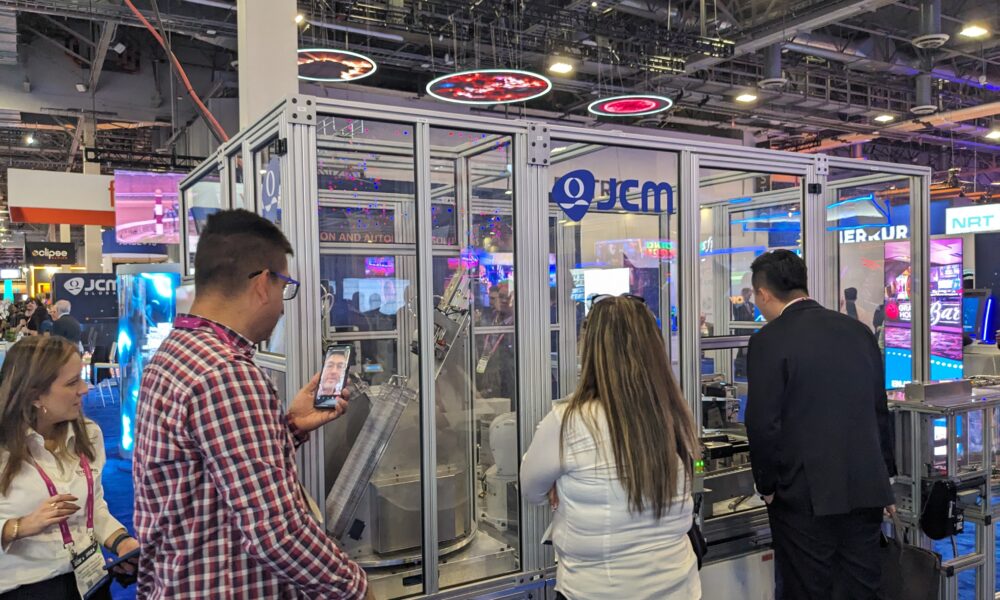JCM Global has come a long way since being founded in 1955 as Japan Cash Machine to sell and repair cash registers.
This year marks the company’s 70th anniversary, celebrating seven decades of advancing transaction and payment technology for the gaming industry.
Dave Kubajak, Senior Vice-President of Sales, Marketing, and Operations, has been with JCM Global for 25 years. He speaks from experience, and from the heart, when he says that “JCM Global has no interest in being a follower and never will be. We absolutely blaze the trail and then others follow us.”
It takes a special organization in the hands of capable leadership to rise from humble beginnings and take command of a technological tidal wave and become a leader and innovator in a global enterprise.
“I would argue that when you look at JCM’s history and how our company has always been focused, our founder and his partners were inventors,” Kubajak said. “They were always looking at technology and trying to figure out ways to bring new technology to the market, as well as adapting existing technologies into new applications.”
Kubajak went on to observe that over the 70 years of its existence, JCM has always been centered around technology and what future customer needs were going to be for whatever market in which JCM has been involved.
“We always focus on bringing something new to the market that nobody else has,” he explained. “Going all the way back to 1955, we have always been heavy technology, heavy engineering, and heavy product management, all focused on innovation.
“JCM has never been or ever wanted to be a ‘me too’ company. We have never wanted to be just another player in any space we have been.”
Kubajak revealed that every technology JCM Global has created has been in response to customer need.
“We listen to what they need, and then we find a solution that we can bring to the market, whether it is through our own innovation or through a partnership, to get it out there and solve a customer’s problem,” he said.
Kubajak recalls with pride when he came on board in 2000 as “employee number 26” for JCM in The Americas, observing “it was a very exciting time because we were in the middle of releasing a new generation of products called the Dollar Bill Validator, which was really a major shift for the U.S. gaming market.”
“We had introduced the first embedded bill validator into casino gaming in partnership with Steve Wynn back in the 1990s,” he continued. “That technology was growing and expanding. In 2000, we had just launched a product called DBV-200, which was a successor to the original product launched with Wynn. It was very innovative for its time and had an embedded barcode ticket scanner.”
Kubajak’s decades of experience has convinced him that JCM Global has “always been an innovator and ahead of the curve when it comes to introducing new technology into the market.” The perfect example is TITO technology.
“Keep in mind it was 2000,” Kubajak began. “TITO was just being introduced to casinos, and this is something a lot of people do not know. JCM Global had developed the industry standard barcode ticket specification for the gaming industry based on some of the talking points that had been going on in the industry about the possibility of launching the TITO concept.
“JCM Global drafted the standard barcode specification, embedded the technology to take a barcode ticket into our bill validators, and launched them into the market. JCM had it ready about two or three years before the market ever had its first live TITO launch.
“That was a big one for us. It really helped us become the dominant player and the leader in the casino gaming market.”
Citing more examples of how JCM responded to customer needs, Kubajak also reflected on casino gaming in the 1990s when operators were still using coins and tokens, trying to figure out how to maximize the casino floor.
“That’s when JCM partnered with Steve Wynn at The Mirage to introduce this new concept of an embedded bill acceptor, or bill validator,” he began. “This dramatically changed gaming, because people could now get much larger amounts of money into play on a slot machine.
“Fast forward to the 2000 timeframe when we introduced TITO technology inside of an embedded bill validator in partnership with the MGM group. MGM was trying to figure out a better way to manage the record levels of the cash it was accepting and handling. They wanted to try and figure out a better way to optimize and simplify that process.”
The MGM group had thoughts about TITO. JCM had the technology regarding barcode ticket reading. They worked together as partners to bring the TITO concept to the gaming industry.
“IGT, which was the dominant supplier at the time, partnered with JCM and released our standard out to the market,” Kubajak said. “TITO just exploded and became the dominant force.”
Looking at the 2010 frame, Kubajak reflected upon a product JCM introduced, called the iVIZION, that had high-resolution digital imaging, something that nobody had ever seen before in the casino gaming industry.
“It allowed us not only to do currency, not only do TITO, but to look at the actual image and use advanced image recognition to determine if a note or TITO ticket was genuine, what the serial numbers on the note were, and validate it,” he explained.
“The demand at that point was that the operators were struggling against counterfeits, very high-end counterfeits called ‘supernotes.’ JCM brought imaging technology to the gaming industry from its banking division.”
“In respect to innovation, we have brought every single new technology that involves transactions to the casino floor,” he added. “When I look at us going forward, I believe that trend will continue. We are the leader in transaction management.”


